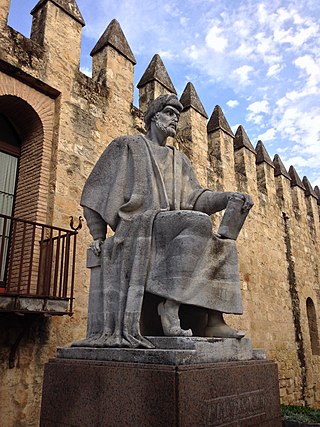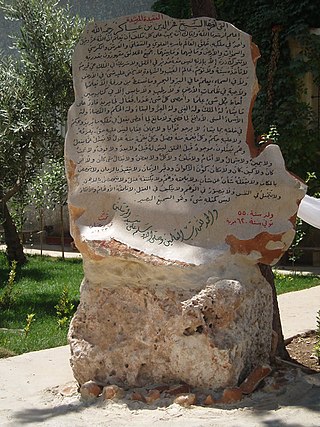Events
| | This section is empty. You can help by adding to it. (March 2017) |
This is a list of philosophy-related events in the 12th century . Philosophy at the time was influenced by the ongoing crusades. [1]
| | This section is empty. You can help by adding to it. (March 2017) |

Scholasticism was a medieval school of philosophy that employed a critical organic method of philosophical analysis predicated upon the Aristotelian 10 Categories. Christian scholasticism emerged within the monastic schools that translated scholastic Judeo-Islamic philosophies, and thereby "rediscovered" the collected works of Aristotle. Endeavoring to harmonize his metaphysics and its account of a prime mover with the Latin Catholic dogmatic trinitarian theology, these monastic schools became the basis of the earliest European medieval universities, contributing to the development of modern science; scholasticism dominated education in Europe from about 1100 to 1700. The rise of scholasticism was closely associated with these schools that flourished in Italy, France, Portugal, Spain and England.

Ibn Rushd, often Latinized as Averroes, was an Andalusian polymath and jurist who wrote about many subjects, including philosophy, theology, medicine, astronomy, physics, psychology, mathematics, Islamic jurisprudence and law, and linguistics. The author of more than 100 books and treatises, his philosophical works include numerous commentaries on Aristotle, for which he was known in the Western world as The Commentator and Father of Rationalism.

Islamic philosophy is philosophy that emerges from the Islamic tradition. Two terms traditionally used in the Islamic world are sometimes translated as philosophy—falsafa, which refers to philosophy as well as logic, mathematics, and physics; and Kalam, which refers to a rationalist form of Scholastic Islamic theology which includes the schools of Maturidiyah, Ashaira and Mu'tazila.

Averroism refers to a school of medieval philosophy based on the application of the works of 12th-century Andalusian philosopher Averroes, a commentator on Aristotle, in 13th-century Latin Christian scholasticism.

Aristotelianism is a philosophical tradition inspired by the work of Aristotle, usually characterized by deductive logic and an analytic inductive method in the study of natural philosophy and metaphysics. It covers the treatment of the social sciences under a system of natural law. It answers why-questions by a scheme of four causes, including purpose or teleology, and emphasizes virtue ethics. Aristotle and his school wrote tractates on physics, biology, metaphysics, logic, ethics, aesthetics, poetry, theatre, music, rhetoric, psychology, linguistics, economics, politics, and government. Any school of thought that takes one of Aristotle's distinctive positions as its starting point can be considered "Aristotelian" in the widest sense. This means that different Aristotelian theories may not have much in common as far as their actual content is concerned besides their shared reference to Aristotle.
Commentator or commentators may refer to:

The Organon is the standard collection of Aristotle's six works on logical analysis and dialectic. The name Organon was given by Aristotle's followers, the Peripatetics, who maintained against the Stoics that Logic was "an instrument" of Philosophy.
This is a list of philosophers from the Western tradition of philosophy.

Al-Walid may refer to:

The Incoherence of the Philosophers is a landmark 11th-century work by the Muslim polymath al-Ghazali and a student of the Asharite school of Islamic theology criticizing the Avicennian school of early Islamic philosophy. Muslim philosophers such as Ibn Sina (Avicenna) and al-Farabi (Alpharabius) are denounced in this book, as they follow Greek philosophy even when, in the author's perception, it contradicts Islam. The text was dramatically successful, and marked a milestone in the ascendance of the Asharite school within Islamic philosophy and theological discourse.
This article presents lists of the literary events and publications in the 11th century.

The Incoherence of the Incoherence by Andalusian Muslim polymath and philosopher Ibn Rushd is an important Islamic philosophical treatise in which the author defends the use of Aristotelian philosophy within Islamic thought.
William of Lucca was an Italian theologian and scholastic philosopher. He taught at Bologna, in the third quarter of the twelfth century.

Commentaries on Aristotle refers to the great mass of literature produced, especially in the ancient and medieval world, to explain and clarify the works of Aristotle. The pupils of Aristotle were the first to comment on his writings, a tradition which was continued by the Peripatetic school throughout the Hellenistic period and the Roman era. The Neoplatonists of the Late Roman Empire wrote many commentaries on Aristotle, attempting to incorporate him into their philosophy. Although Ancient Greek commentaries are considered the most useful, commentaries continued to be written by the Christian scholars of the Byzantine Empire and by the many Islamic philosophers and Western scholastics who had inherited his texts.

Medieval philosophy is the philosophy that existed through the Middle Ages, the period roughly extending from the fall of the Western Roman Empire in the 5th century until after the Renaissance in the 13th and 14th centuries. Medieval philosophy, understood as a project of independent philosophical inquiry, began in Baghdad, in the middle of the 8th century, and in France and Germany, in the itinerant court of Charlemagne in Aachen, in the last quarter of the 8th century. It is defined partly by the process of rediscovering the ancient culture developed in Greece and Rome during the Classical period, and partly by the need to address theological problems and to integrate sacred doctrine with secular learning. This is one of the defining characteristics in this time period. Understanding God was the focal point of study of the philosophers at that time, Muslim and Christian alike.

Peter Abelard was a medieval French scholastic philosopher, leading logician, theologian, poet, composer and musician.
'Abu Bakr Muhammad al-Turtushi, better known as al-Turtushi was one of the most prominent Andalusian political philosophers of the twelfth century. His book Kitāb Sirāj al-Mulūk was one of the most important works of political theory to be produced in the medieval Islamic world. Al-Turtushi was also an accomplished jurist in the Maliki school.
Fasl al-Maqal fi ma bayn al-Hikma wa al-Shariah min Ittisal is an Islamic philosophical treatise written by Andalusian Muslim polymath and philosopher Ibn Rushd (Averroes) (1126–1198), in which the author "critically examine[s] the alleged tension between philosophy and religion" and concludes that philosophy is not in opposition to—and in fact, works in tandem with—Islamic thought. In the work, Averroes argues that some Muslims have an obligation to study philosophy, and that the subject should be considered an Islamic science. The work also contains several other unique ideas, including Averroes' assertion that the Qur’an should sometimes be read in a non-literal way. According to William Theodore De Bary and Ainslie Embree, On the Harmony of Religions and Philosophy represents a "classic attempt to reconcile religion and philosophy."
This is a list of philosophy-related events in the 11th century.

The unity of the intellect, a philosophical theory proposed by the medieval Andalusian philosopher Averroes (1126–1198), asserted that all humans share the same intellect. Averroes expounded his theory in his long commentary on Aristotle's On the Soul to explain how universal knowledge is possible within the Aristotelian philosophy of mind. Averroes's theory was influenced by related ideas propounded by previous thinkers such as Aristotle himself, Plotinus, Al-Farabi, Avicenna and Avempace.